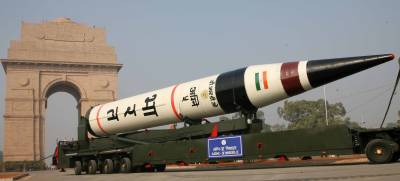
by Anaya Shahid 4 May 2020
Ironically, the decision of US administration to cooperate with India over civil nuclear technology in 2008 carried disastrous implications for global nuclear nonproliferation regimes. The tilt of US interests in Asia Pacific and perks and privileges for India has allowed other states as well to trade nuclear material to India. Besides, there is a well-financed Indian lobby working overtly and covertly globally to promote Indian interests. One of those Indian interests is to hide the clandestine and illicit chapter of Indian nuclear proliferation and to get more material for Indian nuclear weapons program, so that it can stockpile enough to meet its military ambitions.
There are several foreign intelligence reports leaked internationally, indicating that India is running covert operations like financing foreign think tanks and news outlets to influence the political decision makers and civil society of major states. A well-funded and covert Indian agenda is to let us believe that India has a strong nuclear non-proliferation track record. On the opposite, the highly troubling state of affairs though is unnoticed. Indian history of illegal nuclear procurement, proliferation of missiles and nuclear weapons technology and techniques, poor nuclear export controls and mismanagement of nuclear facilities is generally forgotten.
For instance, Canada imposed sanctions on India when it diverted Canadian-supplied nuclear material for research to make weapons, but in 2010 Canadian decision makers forgot it and hypnotized by Indian finances and lobbyists signed a civil nuclear deal. Likewise, the Nuclear Supplier Group (NSG) was created following the nuclear weapon explosion in 1974 by India to restrict nuclear materials, but now it is forgotten, and group states are voting to make India a member. India wants to stockpile nuclear fuel and uranium imported from other countries and exploited from its own mines as much as possible. It has ambitions to use that stockpile for military purposes, fuel strategic weapons like, aircraft carriers, submarines, and missiles warheads, etc.
In 1989, Wisconsin Law School professor Gary Milhollin was of the view that once India exploded an atomic bomb in 1974, the world was shocked. India had taken imported technologies that were under guarantees of peaceful use and used them openly to make plutonium for a nuclear blast. That blast destroyed illusions about the “peaceful atom” and prompted changes in nuclear export policy.
Former Chairmen Dr. Y. S. R. Prasad and Shri Ch. Surendar of Nuclear Power Corporation of India Ltd (NPCIL) were both sanctioned by the United States on September 23, 2004. They violated the Iran Nonproliferation Act of 2000 by transferring equipment and technology of proliferation to Iran since January 1, 1999 and were sanctioned by the U.S. in November 1998 for being “involved in nuclear or missile activities. Similarly in 2004, two other companies were sanctioned on transferring technologies used in the making of weapons of mass destruction to Iran, one was Projects and Development India Limited (PDIL), owned by government of India and the other was Rallis India owned by Tata Chemicals Limited, a private multinational company.
India contrary to the reality stated that these companies were not owned by government, however, these companies are state-owned, for instance PDIL is under the Department of Fertilizers owned by the Government of India. It simply shows that India was involved in nuclear proliferation. Interestingly, the Indian sympathizers find it hard to believe that India has proliferated. In April 2003, diplomatic snubs between India and the U.S. spiked because New Delhi was annoyed over Washington for the CIA released an unclassified report to Congress about India’s illegal nuclear trade with Libya. Moreover, the CIA named India for financing in a Libyan missile program. Therefore, India was quite upset on CIA report that alleged her for helping Libya with its missile program.
Nowadays policies of major powers, including U.S., are seemed to downplay India’s flawed nonproliferation record. India was extensively involved in leaking sensitive centrifuge design information, illicitly procured goods for its nuclear weapons programs, and never thrived to adequately enforced export controls. West is making a broad effort for mainstreaming of nuclear India, which will increase India’s access to dual-use technology. For instance, Indian ambition behind the move to purchase Dassault Rafale jets from France is to use those jets for nuclear strike. Likewise, cooperation by the Western countries over space rockets has been used by India for its missile program and proliferating it to North Korea.
It is a fact that India has some blemished and detailed record of developing both nuclear weapons and ballistic missiles under the pretext of peaceful nuclear and space cooperation. The world needs to take a serious notice of Indian proliferation record and its quest to stockpile nuclear weapons, which is not only contrary to the global nuclear nonproliferation regimes but a serious threat to strategic stability in South Asia.
